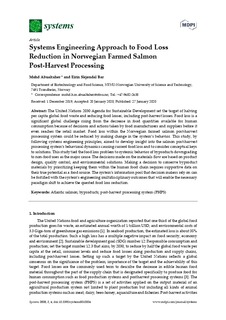| dc.contributor.author | Abualtaher, Moh'd Hasan Moh'd | |
| dc.contributor.author | Bar, Eirin Marie Skjøndal | |
| dc.date.accessioned | 2020-02-05T10:29:06Z | |
| dc.date.available | 2020-02-05T10:29:06Z | |
| dc.date.created | 2020-01-20T10:59:04Z | |
| dc.date.issued | 2020 | |
| dc.identifier.citation | Systems. 2020, 8 (1) | nb_NO |
| dc.identifier.issn | 2079-8954 | |
| dc.identifier.uri | http://hdl.handle.net/11250/2639772 | |
| dc.description.abstract | https://www.mdpi.com/2079-8954/8/1/4 | nb_NO |
| dc.description.abstract | The United Nations 2030 Agenda for Sustainable Development set the target of halving per capita global food waste and reducing food losses, including post-harvest losses. Food loss is a significant global challenge rising from the decrease in food quantities available for human consumption because of decisions and actions taken by food manufacturers and suppliers before it even reaches the retail market. Food loss within the Norwegian farmed salmon post-harvest processing system could be reduced by making change in the system’s behavior. This study, by following systems engineering principles, aimed to develop insight into the salmon post-harvest processing system’s behavioral dynamics causing current food loss and to consider conceptual keys to solutions. This study tied the food loss problem to systemic behavior of byproducts downgrading to non-food uses as the major cause. The decisions made on the materials flow are based on product design, quality control, and environmental solutions. Making a decision to conserve byproduct materials by prioritizing keeping them within the human food chain requires supportive data on their true potential as a food source. The system’s information pool that decision makers rely on can be fortified with the system’s engineering multidisciplinary outcomes that will enable the necessary paradigm shift to achieve the quested food loss reduction. | nb_NO |
| dc.language.iso | eng | nb_NO |
| dc.publisher | MDPI | nb_NO |
| dc.relation.uri | https://www.mdpi.com/2079-8954/8/1/4/pdf | |
| dc.rights | Navngivelse 4.0 Internasjonal | * |
| dc.rights.uri | http://creativecommons.org/licenses/by/4.0/deed.no | * |
| dc.title | "Systems engineering approach to food loss reduction in Norwegian farmed salmon Post-harvest processing." | nb_NO |
| dc.type | Journal article | nb_NO |
| dc.type | Peer reviewed | nb_NO |
| dc.description.version | publishedVersion | nb_NO |
| dc.source.volume | 8 | nb_NO |
| dc.source.journal | Systems | nb_NO |
| dc.source.issue | 1 | nb_NO |
| dc.identifier.doi | https://doi.org/10.3390/systems8010004 | |
| dc.identifier.cristin | 1777385 | |
| dc.description.localcode | This is an open access article distributed under the Creative Commons Attribution License which permits unrestricted use, distribution, and reproduction in any medium, provided the original work is properly cited. | nb_NO |
| cristin.unitcode | 194,66,15,0 | |
| cristin.unitname | Institutt for bioteknologi og matvitenskap | |
| cristin.ispublished | true | |
| cristin.fulltext | original | |
| cristin.qualitycode | 1 | |

